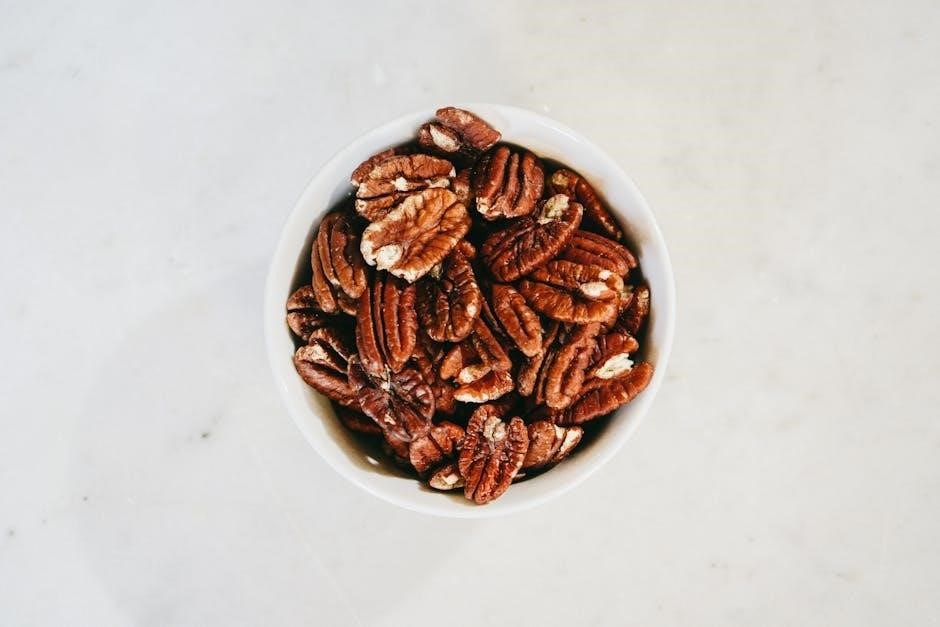A tailored approach combining vegetarian principles with low-carb eating, this diet focuses on weight loss, blood sugar control, and balanced nutrition through nutrient-dense, plant-based foods․
What is a Low-Carb Vegetarian Diet?
A low-carb vegetarian diet is a tailored eating plan that combines vegetarian principles with reduced carbohydrate intake․ It focuses on plant-based foods while minimizing carbs, especially refined and starchy ones․ This diet emphasizes nutrient-dense options like vegetables, lean proteins, and healthy fats․ It aims to promote weight loss, improve blood sugar control, and enhance overall health․ By balancing protein, fiber, and fats, it ensures nutritional needs are met while keeping carb consumption low, typically around 100 grams per day․
Benefits of a Low-Carb Vegetarian Diet
A low-carb vegetarian diet offers numerous health benefits, including weight loss, improved blood sugar control, and enhanced heart health․ It helps reduce blood pressure and cholesterol levels by focusing on whole, nutrient-dense foods․ This diet also promotes increased energy levels and satisfaction from meals․ By cutting refined carbs and sugars, it supports better glucose management and overall well-being․ Additionally, it encourages mindful eating and long-term sustainability, making it a balanced and effective choice for health-conscious individuals․

Principles of the Low-Carb Vegetarian Diet
Emphasizes macronutrient balance, focusing on plant-based proteins, healthy fats, and low-carb vegetables․ It prioritizes nutrient density and mindful portion control to achieve weight and health goals sustainably․
Focusing on Nutrient-Dense Foods
The low-carb vegetarian diet prioritizes whole, unprocessed foods rich in vitamins, minerals, and fiber․ Leafy greens, berries, nuts, and seeds are staples, providing essential nutrients while keeping carb intake low․ Protein sources like tofu, legumes, and eggs are emphasized for satiety and muscle maintenance․ Healthy fats from avocados, olive oil, and flaxseeds support heart health and hormone balance․ This approach ensures sustained energy, improved digestion, and long-term health benefits, making it a balanced and nutritious choice for vegetarians aiming to reduce carbohydrate consumption․
Understanding Net Carbs and Their Importance
Net carbs, calculated as total carbs minus fiber, play a crucial role in a low-carb vegetarian diet․ Tracking net carbs helps manage carbohydrate intake effectively, ensuring meals stay within daily limits․ Aim for around 100 grams of net carbs per day for balanced nutrition and weight loss․ This approach avoids overly restrictive diets while promoting blood sugar stability and satiety․ Understanding net carbs is essential for making informed food choices and maintaining a sustainable, nutrient-rich low-carb vegetarian lifestyle․
Benefits of the Low-Carb Vegetarian Diet
This diet promotes weight loss, improves blood sugar control, supports heart health, and enhances energy levels while providing balanced nutrition and overall wellbeing․
Weight Loss and Improved Blood Sugar Control
The low-carb vegetarian diet is highly effective for weight loss, as it reduces insulin levels, promoting fat burning․ By eliminating refined carbs, it stabilizes blood sugar spikes, improving glucose control․ The focus on protein-rich and high-fiber foods keeps you fuller longer, reducing overall calorie intake․ This approach not only aids in shedding pounds but also enhances metabolic health, making it ideal for those managing diabetes or prediabetes․ The combination of weight loss and improved blood sugar management makes this diet a powerful tool for long-term health benefits․
Heart Health and Reduced Blood Pressure
A low-carb vegetarian diet supports heart health by reducing blood pressure and cholesterol levels․ By focusing on whole, nutrient-dense foods, this approach minimizes refined carbs and sugars, which are linked to cardiovascular risks․ The diet’s emphasis on fiber-rich vegetables, healthy fats, and moderate protein intake helps maintain a balanced lipid profile․ Over time, these changes can lead to improved blood flow and reduced strain on the heart, promoting overall cardiovascular well-being and lowering the risk of hypertension-related conditions․

Foods to Include in a Low-Carb Vegetarian Diet
Foods to include are non-starchy vegetables, healthy fats like avocados, nuts, and seeds, and high-protein options such as tofu and legumes, all whole and nutrient-rich․
High-Protein, Low-Carb Vegetarian Options
High-protein, low-carb vegetarian options include tofu, tempeh, seitan, edamame, lentils, chickpeas, and Greek yogurt․ These foods provide ample protein while keeping carb intake low․ Incorporate protein-rich grains like quinoa and farro in moderation․ Nuts, seeds, and cottage cheese are also excellent choices․ Plant-based protein powders, such as pea or hemp, can supplement meals․ These options ensure a balanced diet, supporting muscle growth and satisfaction without exceeding carb limits, making them ideal for a low-carb vegetarian lifestyle․
Low-Carb, High-Fiber Vegetables
Low-carb, high-fiber vegetables are essential for a balanced diet, offering nutrients and satiety without excess carbs․ Leafy greens like spinach, kale, and broccoli are excellent choices, as they are rich in fiber and low in carbs․ Cauliflower, zucchini, and asparagus are versatile options that can substitute for higher-carb foods․ These vegetables support blood sugar control and digestion, making them ideal for weight management and overall health․ Incorporate them into meals through steaming, roasting, or adding to salads for a nutritious, flavorful diet․
Healthy Fats and Their Role in the Diet
Healthy fats are crucial in a low-carb vegetarian diet, providing energy and aiding nutrient absorption․ Avocados, nuts, seeds, and olive oil are excellent sources of monounsaturated and polyunsaturated fats․ These fats not only enhance meal flavor but also support heart health by improving cholesterol levels․ Incorporating them helps maintain satiety, reducing cravings for high-carb foods․ Balanced intake of these fats ensures a satisfying and nutritionally complete low-carb vegetarian meal plan, promoting overall well-being and weight management effectively․

Foods to Avoid on a Low-Carb Vegetarian Diet
Eliminate high-carb grains, starchy vegetables, sugary foods, and legumes․ Avoid refined carbohydrates, added sugars, and high-glycemic index foods to maintain a balanced low-carb vegetarian lifestyle effectively․
High-Carb Grains and Starches
High-carb grains such as bread, pasta, rice, and cereals are rich in carbohydrates and should be limited․ Starchy vegetables like potatoes, corn, and peas are also high in carbs․ Legumes, including beans and lentils, are nutrient-dense but contain significant carbs․ Refined grains and processed carbohydrates, such as pastries and snacks, are particularly high in empty calories․ To maintain a low-carb diet, focus on whole, unprocessed foods and check nutrition labels to ensure carb counts align with your daily goals․ These foods can hinder weight loss and blood sugar control if consumed excessively․
Sugary Foods and Drinks
Sugary foods and drinks are high in empty carbohydrates and calories, offering little nutritional value․ Candy, sodas, fruit juices, and baked goods should be avoided, as they can spike blood sugar levels and hinder weight loss․ Even natural sources like dried fruits and sweetened plant-based milk can be high in sugar․ Opt for natural sweeteners like stevia or erythritol in moderation․ Choose water, herbal teas, or unsweetened almond milk instead of sugary beverages to stay hydrated and support your low-carb goals without compromising on taste or nutrition․

Sample 7-Day Low-Carb Vegetarian Meal Plan
A structured 7-day meal plan offering delicious, nutrient-dense, low-carb vegetarian recipes designed to support weight loss and overall health with balanced nutrition․
Breakfast Ideas: Low-Carb Vegetarian Recipes
Start your day with delicious, healthy low-carb vegetarian breakfasts․ Try spinach and ricotta omelets, cauliflower pancakes, or chia pudding with berries․ These recipes are high in protein, fiber, and healthy fats, keeping you satisfied while maintaining low carb intake․ Incorporate avocado, nuts, and seeds for added nutrition․ Smoothies made with Greek yogurt, leafy greens, and low-carb fruits like blueberries are also a great option․ These breakfast ideas ensure a balanced and tasty start to your day, supporting weight loss and improved blood sugar control․
Lunch and Dinner Options: Balanced and Delicious
Enjoy flavorful and nutritious low-carb vegetarian lunches and dinners with creative recipes like zucchini noodles with pesto, stuffed bell peppers, and cauliflower rice stir-fries․ Incorporate protein-rich options such as tofu, tempeh, or lentils, paired with roasted or sautéed vegetables․ Salads with avocado, nuts, and olive oil dressing are also great choices․ These meals are designed to be satisfying, visually appealing, and packed with nutrients, ensuring you stay on track with your low-carb goals while enjoying delicious, balanced dishes․
Snacks and Desserts: Low-Carb Vegetarian Choices
Explore delicious low-carb vegetarian snacks and desserts that satisfy cravings without compromising your diet․ Opt for raw or roasted vegetables like cucumber, bell peppers, or cauliflower with dips like hummus or guacamole․ Nuts, seeds, and cheese are excellent protein-rich snacks․ For desserts, try chia pudding with almond milk, sugar-free chocolate, or keto-friendly fruit parfaits․ These options are mindful of portion sizes and focus on natural ingredients, ensuring you enjoy treats while maintaining your low-carb, plant-based lifestyle․
Tips for Success on a Low-Carb Vegetarian Diet
Plan meals, shop smart, and stay hydrated․ Practice mindful eating, track macros, and seek support․ These habits ensure a sustainable and enjoyable low-carb vegetarian journey․
Meal Planning and Grocery Shopping Strategies
Plan meals weekly, focusing on nutrient-dense, low-carb vegetarian options․ Create a grocery list with non-starchy vegetables, lean proteins, and healthy fats․ Shop the perimeter of the store for whole foods, avoiding processed items․ Batch cooking and prepping meals save time and ensure consistency․ Organize your list by store sections to streamline shopping․ Track macros using a carb counter to stay within daily limits․ Don’t forget to check expiration dates for freshness and longevity of ingredients․
Staying Hydrated and Mindful Eating
Drink plenty of water throughout the day, aiming for at least 8 glasses, to support digestion and overall health․ Practice mindful eating by savoring each bite and eliminating distractions like screens․ Pay attention to hunger cues to avoid overeating․ Incorporate herbal teas or infused water for added hydration․ Mindful eating helps maintain portion control and enhances satisfaction, making the low-carb vegetarian diet more sustainable and enjoyable while promoting better digestion and blood sugar balance․
The low-carb vegetarian diet offers a sustainable path to weight loss and improved health through balanced, plant-based meals, fostering long-term wellness and vitality․
Long-Term Sustainability of the Low-Carb Vegetarian Diet
The low-carb vegetarian diet is highly sustainable long-term due to its flexibility and adaptability․ It encourages creativity in meal planning with a variety of nutrient-dense, plant-based foods․ The availability of numerous recipes and meal plans online provides ongoing inspiration, making it easier to stick with the diet without feeling deprived․ By focusing on whole, unprocessed foods, individuals can maintain their health goals and enjoy the benefits of improved well-being and energy levels over time․ This approach aligns well with various lifestyles, ensuring it remains a viable choice for sustained wellness․
Encouragement and Next Steps for Readers
Embrace the low-carb vegetarian diet with confidence, knowing it offers a balanced path to wellness․ Start by exploring the provided meal plans and gradually incorporate new recipes․ Track your progress and celebrate small victories to stay motivated․ Join online communities or consult with a nutritionist for personalized guidance; Remember, consistency and mindfulness are key․ With time, this diet can become a sustainable lifestyle, helping you achieve your health and weight-loss goals while nourishing your body with delicious, nutrient-rich foods․
